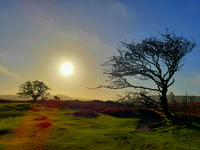 From December, I notice a good deal of tiredness afoot among my patients: the days are shorter, giving us a subtle yet powerful cue to slow down, expend less energy, and sleep longer. Despite this, what happens in our modern culture? People instead seem to have to work ever harder through this month: projects at work have to be finished before the Christmas holidays, and we have preparations to be made in our own lives at the same time. Life actually gets relentlessly busier!
From December, I notice a good deal of tiredness afoot among my patients: the days are shorter, giving us a subtle yet powerful cue to slow down, expend less energy, and sleep longer. Despite this, what happens in our modern culture? People instead seem to have to work ever harder through this month: projects at work have to be finished before the Christmas holidays, and we have preparations to be made in our own lives at the same time. Life actually gets relentlessly busier!
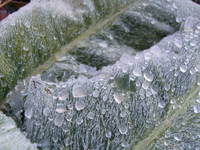 We have had a few frosty mornings, but for the last month, it has mostly felt damp in Devon. The damp of an English winter, especially if combined with cold, can be a challenge to the body if we are inadequately dressed. In Chinese medicine, it is particularly important to protect your lower back (considered the seat of your warming Yang Qi), and your joints (considered vulnerable to adverse climatic factors). In Britain, rheumatic aches and pains are unfortunately very common: I treat a lot of people who can categorically state that their troublesome joints are more uncomfortable when the weather is cold and/or damp. (These associations have been confirmed by research from the University of Manchester: see my post of 24 October 2019 under Arthritis & Joints.)
We have had a few frosty mornings, but for the last month, it has mostly felt damp in Devon. The damp of an English winter, especially if combined with cold, can be a challenge to the body if we are inadequately dressed. In Chinese medicine, it is particularly important to protect your lower back (considered the seat of your warming Yang Qi), and your joints (considered vulnerable to adverse climatic factors). In Britain, rheumatic aches and pains are unfortunately very common: I treat a lot of people who can categorically state that their troublesome joints are more uncomfortable when the weather is cold and/or damp. (These associations have been confirmed by research from the University of Manchester: see my post of 24 October 2019 under Arthritis & Joints.)
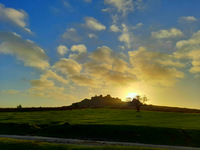 The Chinese recognised this pattern centuries ago, and gave it the name “Bi”; it is described in a medical text dating from 610 AD. Sometimes, but not always, there is evidence of osteoarthritis in the affected joint(s); other times, it may instead be an old injury which plays up in unfavourable weather. What can you do to help yourself if this sounds like you or someone you know? When I am treating this condition, I recommend that my patients wear additional warm layers over the joint concerned, that they avoid the damp eg kneeling on damp ground if the knee is affected, that they have an appropriate diet of warm cooked foods, and that they take up the right kinds of exercise. Acupuncture and self-help can mean that winter need no longer herald in the dreaded rheumatism.
The Chinese recognised this pattern centuries ago, and gave it the name “Bi”; it is described in a medical text dating from 610 AD. Sometimes, but not always, there is evidence of osteoarthritis in the affected joint(s); other times, it may instead be an old injury which plays up in unfavourable weather. What can you do to help yourself if this sounds like you or someone you know? When I am treating this condition, I recommend that my patients wear additional warm layers over the joint concerned, that they avoid the damp eg kneeling on damp ground if the knee is affected, that they have an appropriate diet of warm cooked foods, and that they take up the right kinds of exercise. Acupuncture and self-help can mean that winter need no longer herald in the dreaded rheumatism.
 To remind you that winter will not last forever, remember this symbol from the ancient Chinese Book of Changes or Yi Jing. It is hexagram 24, associated with the winter solstice, this year on 21 December. The solid line on the bottom represents the yang beginning to stir deep within the earth, ready for the lengthening and warming of the days.
To remind you that winter will not last forever, remember this symbol from the ancient Chinese Book of Changes or Yi Jing. It is hexagram 24, associated with the winter solstice, this year on 21 December. The solid line on the bottom represents the yang beginning to stir deep within the earth, ready for the lengthening and warming of the days.
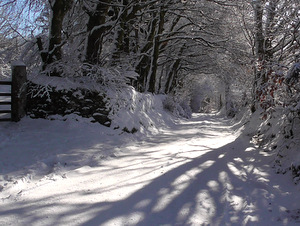 If your mood does tend to be lower at this time of year, be sure to soak up plenty of daylight at every opportunity: try to work by the window for example, as the intensity of natural light is many times greater than artificial light, even when it’s dull and overcast.
If your mood does tend to be lower at this time of year, be sure to soak up plenty of daylight at every opportunity: try to work by the window for example, as the intensity of natural light is many times greater than artificial light, even when it’s dull and overcast.
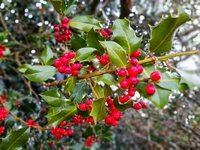 If you have more time, go out and explore the Devon countryside for a longer trek: clamber down into some of our deep, wooded valleys, and follow rivers like the Bovey or Teign, to tune into the stillness of a season which is actually very special in its own way. Let the meditative state of mind which can be induced by rhythmically putting one foot in front of the other, help you to reflect quietly on the year that has gone by, and the year of opportunity which is to come.
If you have more time, go out and explore the Devon countryside for a longer trek: clamber down into some of our deep, wooded valleys, and follow rivers like the Bovey or Teign, to tune into the stillness of a season which is actually very special in its own way. Let the meditative state of mind which can be induced by rhythmically putting one foot in front of the other, help you to reflect quietly on the year that has gone by, and the year of opportunity which is to come.

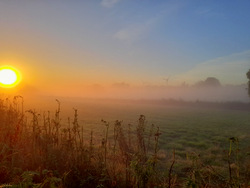 A change of season is always seen in Chinese medicine, as a challenge to the body, and a time when we should take care to adjust our lifestyle and habits. We have already experienced a hint of autumn in the recent rain showers and after such a long, dry spell, the trees are gently yellowing. The 22nd of the month marks the equinox, toadstools will soon be appearing on our lawns and spider webs await the first person of the day to walk by. This is the season which can lull us into a false sense of security with its mellow abundance. But as dew turns to frost, we realise by November we have been led gently to the gate of winter, and the scales have tipped in favour of the dark and the Yin.
A change of season is always seen in Chinese medicine, as a challenge to the body, and a time when we should take care to adjust our lifestyle and habits. We have already experienced a hint of autumn in the recent rain showers and after such a long, dry spell, the trees are gently yellowing. The 22nd of the month marks the equinox, toadstools will soon be appearing on our lawns and spider webs await the first person of the day to walk by. This is the season which can lull us into a false sense of security with its mellow abundance. But as dew turns to frost, we realise by November we have been led gently to the gate of winter, and the scales have tipped in favour of the dark and the Yin.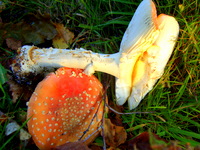 This year, we had a very warm and sunny July and August, so you might be going into the autumn feeling your batteries and vitamin D levels have been topped up. Nevertheless, it’s now worth paying particular attention to your health, because this will stand you in good stead through the next five months.
This year, we had a very warm and sunny July and August, so you might be going into the autumn feeling your batteries and vitamin D levels have been topped up. Nevertheless, it’s now worth paying particular attention to your health, because this will stand you in good stead through the next five months.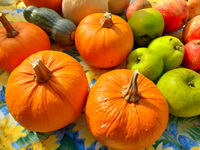 Looking firstly at diet, we can begin a tilt in favour of more warm, cooked foods: porridge for breakfast is an excellent start to the day. Cut back on the salads, replacing them with what nature in September and October is prompting us to use instead: how about a hot pumpkin pie or a root vegetable soup? There seems to be a bumper apple crop so try baked apples with a sprinkling of cinnamon and nutmeg. If in doubt over diet, just ask yourself whether it is locally grown in Devon and in season. If the answer is yes, then from a Chinese medical perspective, you are unlikely to go far wrong.
Looking firstly at diet, we can begin a tilt in favour of more warm, cooked foods: porridge for breakfast is an excellent start to the day. Cut back on the salads, replacing them with what nature in September and October is prompting us to use instead: how about a hot pumpkin pie or a root vegetable soup? There seems to be a bumper apple crop so try baked apples with a sprinkling of cinnamon and nutmeg. If in doubt over diet, just ask yourself whether it is locally grown in Devon and in season. If the answer is yes, then from a Chinese medical perspective, you are unlikely to go far wrong.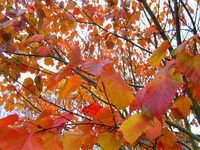 Next, there is dress. In early autumn, to encourage gradual adaptation of the body to the cold which lies in wait in the months ahead, do not put on too many warm clothes too soon. Equally important at this point in the year, is the taking of plenty of outdoor exercise. The Chinese divide autumn into six so-called solar terms, to which we can readily relate by virtue of their simple, descriptive titles: beginning of autumn, limit of heat, white dew, autumn equinox, cold dew, frost’s descent. You can gradually adjust your clothing according to which stage you feel we have progressed to.
Next, there is dress. In early autumn, to encourage gradual adaptation of the body to the cold which lies in wait in the months ahead, do not put on too many warm clothes too soon. Equally important at this point in the year, is the taking of plenty of outdoor exercise. The Chinese divide autumn into six so-called solar terms, to which we can readily relate by virtue of their simple, descriptive titles: beginning of autumn, limit of heat, white dew, autumn equinox, cold dew, frost’s descent. You can gradually adjust your clothing according to which stage you feel we have progressed to.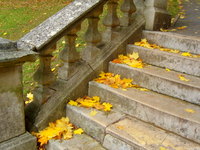 Turning to sleep, traditional teachings recommend we adjust our bedtime to remain in harmony with the rhythms of nature: in autumn, we can continue to rise early, as is the recommendation in summer, but we should now try to retire earlier in the evening.
Turning to sleep, traditional teachings recommend we adjust our bedtime to remain in harmony with the rhythms of nature: in autumn, we can continue to rise early, as is the recommendation in summer, but we should now try to retire earlier in the evening.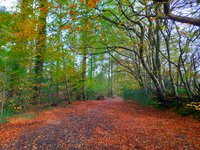 Finally, if the lower light levels on overcast days plus the now ever-shortening length of the day, conspire to lower your mood, then I can offer two recommendations: one is, if you have to be indoors, to locate yourself right in front of a window; the other is to take a thirty minute walk in the fresh air daily. The latter could be a lunchtime stroll if you are normally confined to a desk all day. These measures will dramatically increase the light levels you are exposed to, and combined with fresh air, will help you to feel better. In addition, the beautiful autumn colours which the trees hopefully have in store for us over the next month, will provide food for your soul.
Finally, if the lower light levels on overcast days plus the now ever-shortening length of the day, conspire to lower your mood, then I can offer two recommendations: one is, if you have to be indoors, to locate yourself right in front of a window; the other is to take a thirty minute walk in the fresh air daily. The latter could be a lunchtime stroll if you are normally confined to a desk all day. These measures will dramatically increase the light levels you are exposed to, and combined with fresh air, will help you to feel better. In addition, the beautiful autumn colours which the trees hopefully have in store for us over the next month, will provide food for your soul.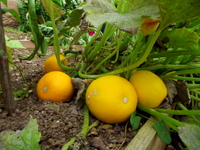 Late summer, or chang xia, is the fifth season in the Chinese calendar, and in my view, the missing one in our own. As we stew in that classic August combination of warmth and humidity, just consider for a moment how different this month feels from June, and you can quickly see why this period in the year justifies its own seasonal division.
Late summer, or chang xia, is the fifth season in the Chinese calendar, and in my view, the missing one in our own. As we stew in that classic August combination of warmth and humidity, just consider for a moment how different this month feels from June, and you can quickly see why this period in the year justifies its own seasonal division.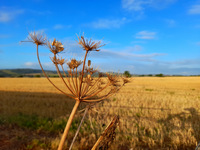 In traditional Chinese culture, energy now is considered to be at a stillpoint, or to have plateaued after a peak in June, and before its descent into autumn. We experience this as a sense of restfulness in the world: much of the country seems to be on holiday, and nature too takes time off. Birdsong is less noticeable, now that they have found mates, raised fledglings and left empty nests.
In traditional Chinese culture, energy now is considered to be at a stillpoint, or to have plateaued after a peak in June, and before its descent into autumn. We experience this as a sense of restfulness in the world: much of the country seems to be on holiday, and nature too takes time off. Birdsong is less noticeable, now that they have found mates, raised fledglings and left empty nests.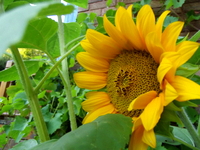 Evenings have drawn in by an hour or so. The rays of the sun are more watery compared with that penetrating, almost Mediterranean, overhead brilliance that we see in June in Devon and Cornwall. The exciting, vibrant greens of spring, have given way to darker, mature foliage in woods and in our gardens. Plant and lawn growth has slowed.
Evenings have drawn in by an hour or so. The rays of the sun are more watery compared with that penetrating, almost Mediterranean, overhead brilliance that we see in June in Devon and Cornwall. The exciting, vibrant greens of spring, have given way to darker, mature foliage in woods and in our gardens. Plant and lawn growth has slowed.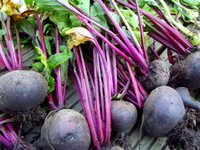 The theme now is about to become one of harvest and abundance: blackberries appear in the hedgerows, and your allotment bears fruit. The corn is tall in the fields. It is a time of reward for your efforts, when nature pays you a return on your investment.
The theme now is about to become one of harvest and abundance: blackberries appear in the hedgerows, and your allotment bears fruit. The corn is tall in the fields. It is a time of reward for your efforts, when nature pays you a return on your investment. So what should we draw from all of this? Notice this moment of stillness before we take a little tilt down and autumn appears over the horizon. Soak up some soft rays of lower, August sunshine whilst filling a bowl with blackberries. Make sure you have had a holiday; this is a late opportunity to supplement your reserves ready for the coming winter. Above all, I hope you will find profound enjoyment in the beauty of late summer, and our constantly revolving seasons.
So what should we draw from all of this? Notice this moment of stillness before we take a little tilt down and autumn appears over the horizon. Soak up some soft rays of lower, August sunshine whilst filling a bowl with blackberries. Make sure you have had a holiday; this is a late opportunity to supplement your reserves ready for the coming winter. Above all, I hope you will find profound enjoyment in the beauty of late summer, and our constantly revolving seasons.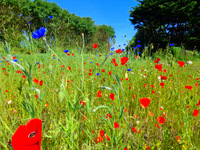 May got off to a settled start weather-wise, and will hopefully become warmer and drier again, but the days are rapidly approaching their longest. If you love the great outdoors or tending your garden, you can put in a full day at work, then still enjoy two or three hours outside. The sun in south-west England now takes on a more brilliant, overhead quality, and you can see why artists are attracted here to paint.
May got off to a settled start weather-wise, and will hopefully become warmer and drier again, but the days are rapidly approaching their longest. If you love the great outdoors or tending your garden, you can put in a full day at work, then still enjoy two or three hours outside. The sun in south-west England now takes on a more brilliant, overhead quality, and you can see why artists are attracted here to paint.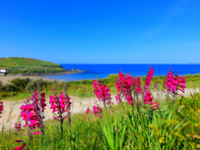 In ancient China, summer was seen as “Heaven on Earth”, when the full splendour of heaven’s energy is manifest around us. This is nature at its zenith, and the time of year when our energy and activity levels peak. As regards health advice in summer, it is considered wise to rise earlier in the morning, and it’s fine to stay up later into the evening. Spend time outside and soak up the sunshine and fresh air, as if you are charging your battery ready for the eventual return of winter. If you have been contemplating beginning an exercise program, then now is the moment, especially if it’s an outdoor sport you would like to take up; if you are short of time, you could start walking or cycling to work.
In ancient China, summer was seen as “Heaven on Earth”, when the full splendour of heaven’s energy is manifest around us. This is nature at its zenith, and the time of year when our energy and activity levels peak. As regards health advice in summer, it is considered wise to rise earlier in the morning, and it’s fine to stay up later into the evening. Spend time outside and soak up the sunshine and fresh air, as if you are charging your battery ready for the eventual return of winter. If you have been contemplating beginning an exercise program, then now is the moment, especially if it’s an outdoor sport you would like to take up; if you are short of time, you could start walking or cycling to work.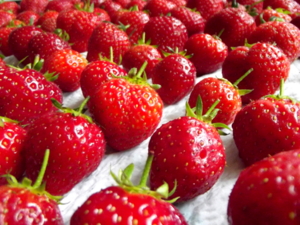 It is easier also over the next few months, to adhere to the traditional Chinese dietary advice of eating produce which is locally grown and in season. (“Food miles” is a recently introduced term, often invoked to draw attention to the cost to the environment of putting say, kiwi fruit on the UK shelves in December, but in energetic medicine, food which has travelled vast distances is also considered slightly denatured and less wholesome for the body.)
It is easier also over the next few months, to adhere to the traditional Chinese dietary advice of eating produce which is locally grown and in season. (“Food miles” is a recently introduced term, often invoked to draw attention to the cost to the environment of putting say, kiwi fruit on the UK shelves in December, but in energetic medicine, food which has travelled vast distances is also considered slightly denatured and less wholesome for the body.) 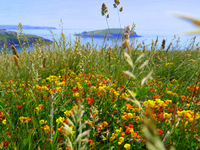 Because summer weather is more favourable, and our bodies are not struggling so hard to maintain a warm, dry internal climate in an energetic sense, you can sample the full variety of salad vegetables and all the health-giving berries on offer.
Because summer weather is more favourable, and our bodies are not struggling so hard to maintain a warm, dry internal climate in an energetic sense, you can sample the full variety of salad vegetables and all the health-giving berries on offer. Finally, if you are very physically active, and still up and about late on a summer’s evening, consider a short siesta on days when it’s practical. Just twenty minutes lying horizontal somewhere between around 1.00 and 3.00pm, is considered very replenishing.
Finally, if you are very physically active, and still up and about late on a summer’s evening, consider a short siesta on days when it’s practical. Just twenty minutes lying horizontal somewhere between around 1.00 and 3.00pm, is considered very replenishing.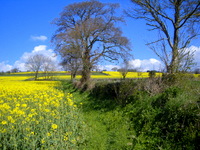
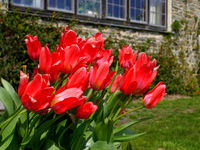 For the purposes of this article, the period of spring is around early March to mid-May. It is defined usually by milder days and an increase in activity in nature. We have enjoyed daffodils for a few weeks already, and the primroses are flourishing on Devon’s sunny banks and verges. We arrive soon though at the equinox, at which point we truly move into the more Yang phase of the annual cycle. The length of the day will then for the next six months, become greater than the length of the night.
For the purposes of this article, the period of spring is around early March to mid-May. It is defined usually by milder days and an increase in activity in nature. We have enjoyed daffodils for a few weeks already, and the primroses are flourishing on Devon’s sunny banks and verges. We arrive soon though at the equinox, at which point we truly move into the more Yang phase of the annual cycle. The length of the day will then for the next six months, become greater than the length of the night.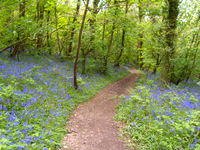 Ancient Chinese culture traditionally saw this season as two phases: a sprouting up (fa) and an unfolding (chen). The character for fa is a bow and arrow, with the ground being pierced open by something which has been held back ie the arrow. Chen then refers to the proliferation of growth which we witness in our gardens, woodlands and verges.
Ancient Chinese culture traditionally saw this season as two phases: a sprouting up (fa) and an unfolding (chen). The character for fa is a bow and arrow, with the ground being pierced open by something which has been held back ie the arrow. Chen then refers to the proliferation of growth which we witness in our gardens, woodlands and verges.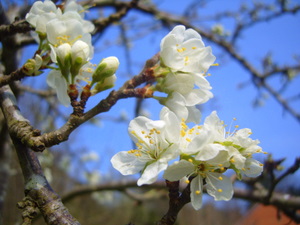 Whereas in winter, old Chinese wisdom teaches us to retire earlier to bed and to rise later too, with the coming of spring, we should continue to retire early, but can now begin to rise earlier. The mornings are getting progressively lighter, and the birds are greeting the dawn with enthusiasm and joy in their song. This is a time of day which offers you the opportunity of a moment of meditation, a moment which will stand you in good stead for whatever the rest of the day may hold. Try to take a walk before work, or even just sit in your garden if it’s not too cold. The Qi at this time of the morning is fresh and renewed, like a sparkling, clear brook from which you can sip. If you cannot be outside, then begin the day with some stretches, as if awakening your body from its long, winter sleep.
Whereas in winter, old Chinese wisdom teaches us to retire earlier to bed and to rise later too, with the coming of spring, we should continue to retire early, but can now begin to rise earlier. The mornings are getting progressively lighter, and the birds are greeting the dawn with enthusiasm and joy in their song. This is a time of day which offers you the opportunity of a moment of meditation, a moment which will stand you in good stead for whatever the rest of the day may hold. Try to take a walk before work, or even just sit in your garden if it’s not too cold. The Qi at this time of the morning is fresh and renewed, like a sparkling, clear brook from which you can sip. If you cannot be outside, then begin the day with some stretches, as if awakening your body from its long, winter sleep.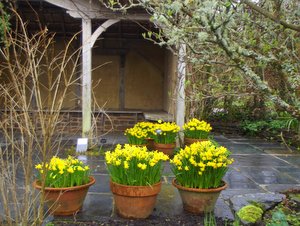 In early spring, the Chinese taught that the body’s pores are beginning to open. This is considered to reduce our resistance to cold. Because cold weather might still linger through the first half of April, we should not therefore cast off too many layers of winter clothing prematurely. Our own cultural parallel is of course, “Ne’re cast a clout ’till may is out.” This probably means do not abandon your winter clothing until the may or hawthorn tree blossoms, again usually after some warmer days in late April. If you feel at all chilly, then you are underdressed, and need to take prompt action.
In early spring, the Chinese taught that the body’s pores are beginning to open. This is considered to reduce our resistance to cold. Because cold weather might still linger through the first half of April, we should not therefore cast off too many layers of winter clothing prematurely. Our own cultural parallel is of course, “Ne’re cast a clout ’till may is out.” This probably means do not abandon your winter clothing until the may or hawthorn tree blossoms, again usually after some warmer days in late April. If you feel at all chilly, then you are underdressed, and need to take prompt action.